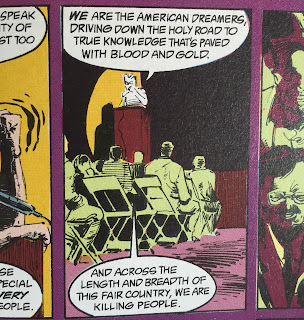 I do like a bit of Peter Straub. His books have a kind of freshness and intelligence that I enjoy seeing in horror novels. Although dealing with the classic tropes, there's a deep humanity that keeps them clinging in your head, somewhere in the back. Even years after reading them, I'll sit up with a shudder, suddenly remembering a line of his description, a scene he painted, the angle of light you imagined in a house he described.
I do like a bit of Peter Straub. His books have a kind of freshness and intelligence that I enjoy seeing in horror novels. Although dealing with the classic tropes, there's a deep humanity that keeps them clinging in your head, somewhere in the back. Even years after reading them, I'll sit up with a shudder, suddenly remembering a line of his description, a scene he painted, the angle of light you imagined in a house he described.He's one of those writers who you need to read a couple of times to get in to the heart of his books - you'll skittle along on a surface reading, maybe unaware of the cloudy, terrible depths beneath you. But the depths are there all the same, and they're very dark.
So, Lost Boy, Lost Girl - for those of you familiar with Straub's work, it's a Millhaven novel (for those of you who aren't, don't worry) and it gains a lot of power from the inhabiting that liminal space between human horror and supernatural horror which Straub always exploits so well. It's good, very good, and generally, I have to recommend it to readers with a strong stomach and a taste for the disturbing.
Something which caught me about it, though, is that it felt a very American novel. I'm not saying this as a criticism of any kind. It's not to say, either, that his other works lack a sense of a specific place. It is rather that the horror he explores elsewhere has a universal, almost antique, feel. You can taste the air of the place the horror it occurs, but the horror itself could find you where ever you stood. The places, too, have a parallel to places I have been - the location is very specific, but it is not specifically American.
Lost Boy, Lost Girl could be set nowhere else. The basis of the plot revolves around the gridlike street structure of American towns. The relationships are defined by the landscape in which they are set; the concerns of the characters, their demographics, even their physical interactions with each other seem defined by the very American-ness of the setting. As I say, this isn't a criticism, nor does he present a generic, airbrushed Hollywood America that someone from this side of the pond will know from imported sitcoms and teen movies. No, it felt very genuine, but it brought a pronounced sense of foreigness, almost an exoticism, that made the whole experience a little unreal and defamiliarising.
This was only heightened by the somewhat American concerns of the novel. This is not vampires, or black magic, not an imported horror. No, it exists in a area between urban legend and historical fact that seems uniquely American: fascination with the serial killer. America does not have the monopoly on murder, or even on sadistic mass murderers - but it is only in America that they seem to hold that kind mythic cachet. As the Corinthian says:
Almost, however, this specificity gave the book its power to unsettle, upset and captivate. It ran headlong into the promise of the American dream, and the darknesses beneath it. Anyway. Very good. One for horror fans.

No comments:
Post a Comment